We may not have the course you’re looking for. If you enquire or give us a call on +44 1344 203999 and speak to our training experts, we may still be able to help with your training requirements.
Training Outcomes Within Your Budget!
We ensure quality, budget-alignment, and timely delivery by our expert instructors.
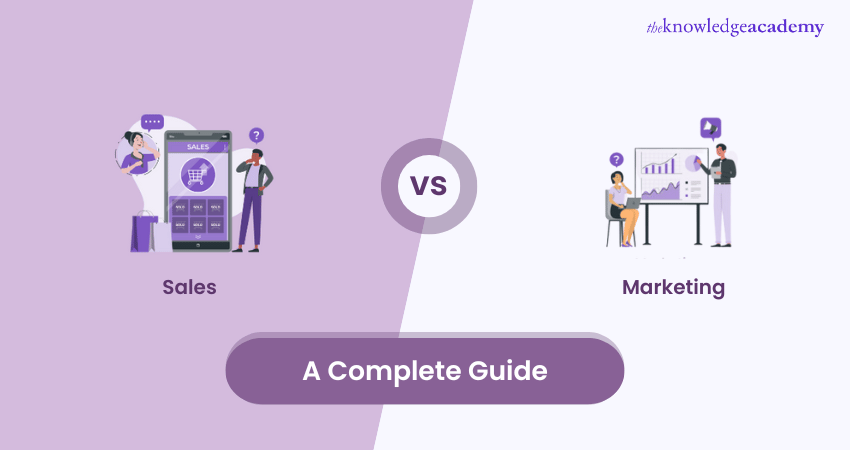
Sales and marketing are often seen as two sides of the same coin, but they play distinct roles within an organisation. Both are essential for driving revenue, yet their goals, strategies, and metrics vary significantly. Grasping the Difference Between Sales and Marketing is vital for any business aiming to succeed.
Marketing is all about creating buzz and generating interest in a product or service. It involves crafting compelling messages, building a strong brand identity, and attracting potential customers. Sales, on the other hand, focuses on directly engaging with these prospects, addressing their needs, and turning interest into actual transactions.
This blog will delve into the Difference Between Sales and Marketing, explore how they interact, and offer insights on optimising both for maximum impact. Let’s uncover the unique roles they play and how they can work together to drive your business forward.
Table of Contents
1) What is Sales?
2) What is Marketing?
3) Sales and Marketing: Key Differences
4) Skills for Salespeople
5) Skills for Marketers
6) Managing Sales and Marketing Departments
7) Importance of Collaboration
8) Conclusion
What is Sales?
Sales is far more than a mere transaction; it is an art form involving the creation of connections, comprehension of needs, and presentation of customised solutions. At its core, Sales is the process of persuading potential customers that a product or service aligns with their aspirations or solves their challenges. This personal, interactive journey transforms curiosity into conviction, hesitation into confidence, and consideration into commitment.
The purpose of Sales extends beyond the exchange of goods or services for money. It is about creating value, fostering relationships, and offering solutions that improve customers' lives. Sales is the channel through which businesses build customer relationships, drive revenue, and propel growth.
Goals of Sales
Sales efforts are guided by specific goals, including:
a) Closing Deals: Converting potential leads into paying customers by guiding them from interest to purchase.
b) Revenue Generation: Driving the financial health of the organisation by successfully closing deals.
c) Meeting Targets: Working towards predetermined quotas or targets, which serve as benchmarks for performance.
d) Customer Relationship Building: Establishing trust and credibility by addressing customer needs, handling objections, and offering tailored solutions.
Strategies and Techniques
Sales strategies include a range of techniques designed to foster meaningful engagement, such as:
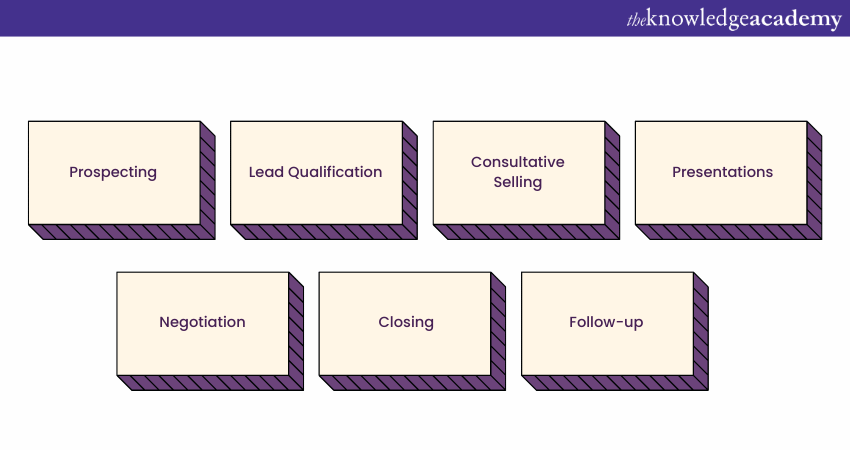
a) Prospecting: Identifying potential customers likely to be interested in the product or service.
b) Lead Qualification: Assessing the suitability of leads for conversion into customers.
c) Consultative Selling: Engaging in conversations to understand the customer’s needs before offering solutions.
d) Presentations: Demonstrating how the offering addresses specific pain points.
e) Negotiation: Collaborating to reach mutually beneficial terms.
f) Closing: Securing the customer’s commitment.
g) Follow-up: Ensuring post-purchase satisfaction, paving the way for referrals and repeat business.
Master the art of sales with our expert-led Sales Training Courses. Learn how to boost your performance and achieve success. Get started now and start closing more deals!
Skills for Salespeople
Sales is well-suited to individuals with specific personality traits and a particular skill set. Key skills required include:
a) Confidence: Successful salespeople are typically confident in what they’re selling, comfortable interacting with others, and assertive when necessary.
b) Resilience: Given that salespeople often face rejections, objections, and other challenges in their pursuit of a sale, resilience is a crucial personality trait.
c) Communication Skills: Effective communication, especially strong listening skills, is vital. This allows salespeople to persuasively address potential customers’ needs based on the information shared during conversations.
d) Rapport Building: Salespeople must appear trustworthy and professional. By effectively building rapport, they can increase the likelihood of closing more sales.
e) Sociability: Being naturally social makes a salesperson more approachable. Developing this skill can also be beneficial in other roles you may pursue in the future.
Elevate your Sales expertise with our Sales Management Course – empower your team and transform your results!
What is Marketing?
Marketing is more than just promoting products or services; it's the art of storytelling that captivates, informs, and connects with a target audience. At its essence, Marketing involves creating, communicating, and delivering value to customers. It’s about crafting compelling messages that convey a brand's identity, positioning, and the benefits of its offerings.
The purpose of Marketing extends beyond facilitating transactions; it’s about building lasting relationships and fostering meaningful connections. Through various strategies, Marketing shapes perceptions, influences decisions, and cultivates a sense of affinity and loyalty toward a brand. In essence, Marketing is the vehicle through which businesses share their unique essence with the world.
Goals of Marketing
Marketing is driven by specific goals that steer its strategic direction. These include:
a) Brand Awareness: Establishing a strong, memorable presence in the minds of the target audience. Effective Marketing ensures that the brand is easily recognised and associated with distinct qualities.
b) Lead Generation: Generating a steady flow of potential customers who show interest in the products or services, laying the groundwork for future Sales interactions.
c) Audience Engagement: Capturing and maintaining the attention of the target audience through engaging content, interactive experiences, and meaningful communication.
d) Educating Customers: Providing valuable information about products or services, helping potential customers understand how these offerings can address their needs or solve their challenges.
e) Building Trust: Establishing credibility and trust with the audience through consistent messaging, authentic communication, and delivering on promises.
Elevate your Sales expertise with our Sales Management Course – empower your team and transform your results!
Strategies and Techniques
The following are some of the most used Marketing strategies and techniques.
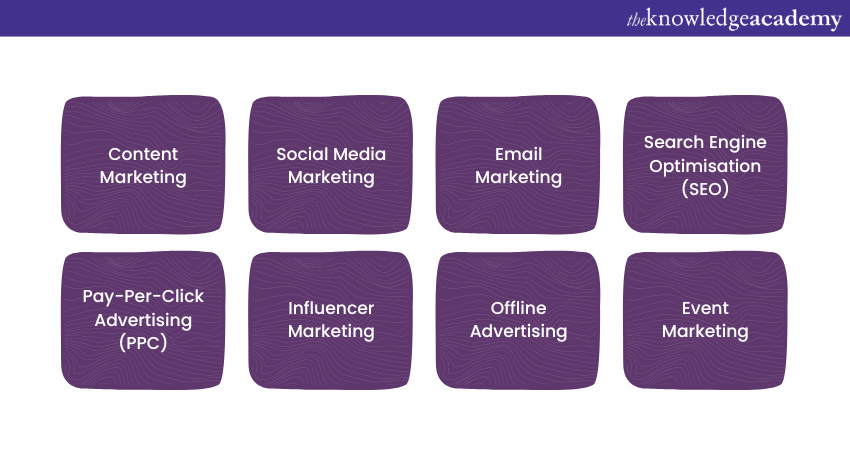
a) Content Marketing: Create engaging content through Content Marketing strategies like blog posts, videos, and articles that resonate with your audience's interests and needs, helping to establish your brand's authority and reliability.
b) Social Media Marketing: Connect with your target audience using Social Media Marketing on platforms like Facebook, Instagram, and Twitter. Through Social Media Marketing, you can run ad campaigns, foster connections, and humanise your brand effectively.
c) Email Marketing: Deliver personalised messages to your audience’s inboxes through Email Marketing, including newsletters and product updates, to strengthen customer relationships and build loyalty.
d) Search Engine Optimisation (SEO): Enhance your online visibility through SEO by optimising your content for search engines, driving organic traffic to your website through strategic keyword usage.
e) Pay-Per-Click Advertising (PPC): Secure prominent positions in search results or on social media through PPC paid campaigns that target specific keywords, reaching users actively searching for related products or services.
f) Influencer Marketing: Partner with influencers to authentically promote your products or services to their engaged followers, leveraging their credibility and reach.
g) Offline Advertising: Reach broader audiences through traditional media channels like print ads, billboards, radio, and TV commercials, adding a tangible dimension to your brand’s presence.
h) Event Marketing: Engage with your audience directly through in-person events like trade shows, workshops, and launch parties, creating memorable experiences and deeper connections.
Skills for Marketers
Marketing is a profession that suits individuals with particular skills and interests, including:
a) Creativity: Essential for marketers, as the strategies used to engage potential customers are continually evolving.
b) Interpersonal Skills: Marketers interact with a diverse range of people, from internal stakeholders to the public, making strong interpersonal skills crucial for building effective working relationships.
c) Adaptability: Given that marketing is a fast-paced and ever-changing field, the ability to adapt quickly to new circumstances is vital.
d) Data Interpretation: Effective marketing strategies are driven by high-quality data, so strong data analysis skills are essential for success.
e) Research: Marketers conduct extensive research on audiences and topics when building campaigns, designing strategies, or creating content, making strong research skills a key requirement for the role.
Unlock your marketing potential with our expert-led Marketing Training. Sign up now!
Sales and Marketing: Key differences
The symphony of business is composed of intricate movements, with each section playing a distinct yet interconnected role. In this composition, Marketing and Sales emerge as two principal movements, each contributing its own melody to the overall harmony. Let's dive deeper into the Difference Between Sales and Marketing:
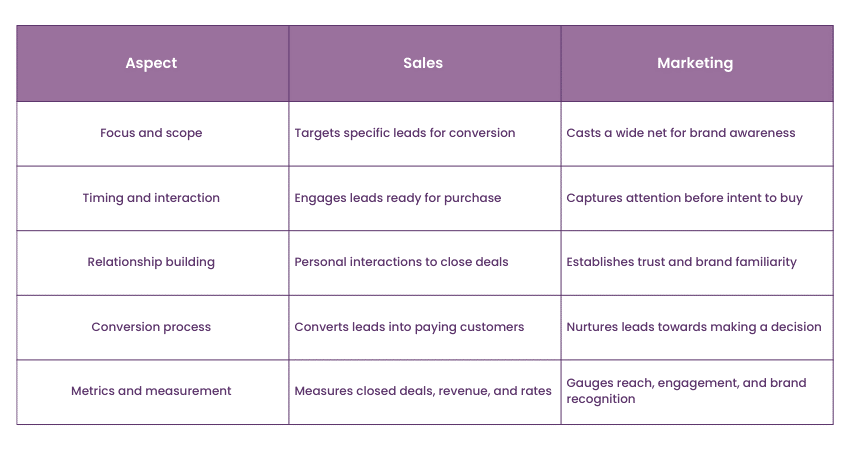
Focus and Scope
Think of Marketing as the panoramic lens that captures the grandeur of the business landscape. It seeks to cast a wide net, ensuring that the brand's resonance reaches far and wide. Marketing strategies encompass diverse channels – from captivating social media campaigns to engaging content creation – all in the pursuit of casting a spell on a broad audience.
Sales, then, can be likened to a jeweller's loupe, honing in on the subtle nuances. It narrows the focus to individuals or entities that have demonstrated a distinct interest in the product or service. Sales interactions are a personal rendezvous, engaging with those who are not just spectators but potential participants in the grand narrative of the business.
Timing and Interaction
The Marketing overture begins before the curtain rises, when the audience is seated in anticipation. It sparks curiosity, captures attention, and sets the stage for what's to come. The interaction is indirect yet powerful – through compelling visuals, persuasive copy, and immersive experiences that lay the foundation for the upcoming act.
As the main act unfolds, Sales takes centre stage. This is the moment when the spotlight shines brightly on a potential transaction. It's an intimate exchange, a dialogue between the seller and the buyer. Sales interactions are not just about information; they're about forging a connection, understanding needs, and guiding the customer through the final steps of their decision-making journey.
Relationship Building
Marketing lays the cornerstone of relationships. It's akin to planting the seeds of connection, tending to them with regular touchpoints. Through engaging content, valuable insights, and interactive campaigns, Marketing fosters familiarity and trust, creating a fertile ground for relationships to flourish.
With the groundwork set, Sales takes on the role of a relationship artisan, shaping connections into meaningful alliances. Sales professionals delve into the intricacies of individual needs, building upon the foundation created by Marketing. The relationship becomes more tangible as discussions become tailored, objections are addressed, and solutions are presented.
Conversion Process
Picture Marketing as the curator of curiosity. It feeds the flames of interest, guiding potential customers from a place of unfamiliarity to one of consideration. It's the nurturing process that accompanies the early stages of a customer's journey.
As the journey progresses, Sales embarks on the art of persuasion. This is the phase where customers are not just considering the options but are ready to make a decision. Sales professionals delicately guide the conversation, handle objections, and extend a hand to assist customers in taking the final leap towards purchase.
Metrics and Measurement
The efficacy of Marketing efforts is often quantified through metrics such as reach, engagement, website traffic, and brand awareness. These metrics offer insights into how successful Marketing campaigns are in generating interest and nurturing potential leads.
Sales performance, on the other hand, is gauged by concrete outcomes – closed deals, revenue earned, and conversion rates. These metrics serve as tangible indicators of the success of Sales efforts to turn potential leads into paying customers.
Importance of Collaboration
In the symphony of business, where the melodies of Sales and Marketing intertwine, the importance of collaboration becomes a crescendo that shapes the harmonious symphony of success. Let's delve deeper into why the collaboration between these two functions is not just beneficial but crucial:
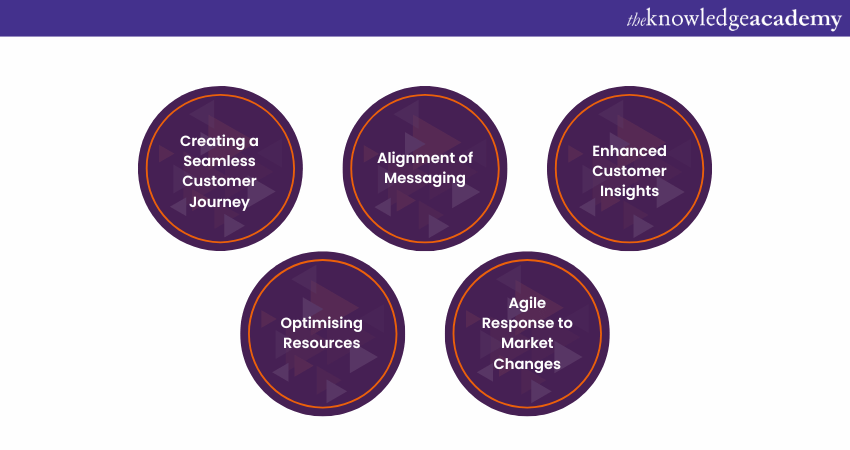
Creating a Seamless Customer Journey
When Sales and Marketing collaborate effectively, they create a seamless customer journey where transitions are smooth and consistent. Marketing sparks interest and captures attention, while Sales guides customers toward making a decision. This coordinated approach ensures that customers feel valued and understood at every step.
Alignment of Messaging
Consistency in messaging is crucial in business. Collaboration between Sales and Marketing ensures that the narratives crafted by Marketing align with what Sales presents. This alignment allows Sales professionals to deliver cohesive messages that resonate with customers' needs and aspirations.
Enhanced Customer Insights
Sales and Marketing collaboration generates valuable customer insights. Marketing gathers data on customer behaviour and preferences, while Sales provides real-time feedback. Sharing this information allows both teams to refine strategies, leading to more meaningful customer interactions and higher conversions.
Optimising Resources
Collaboration between Sales and Marketing optimises resources by pooling strengths. Marketing supplies Sales with content, collateral, and leads, while Sales offers feedback on lead quality. This synergy fosters efficiency and reduces redundancy.
Agile Response to Market Changes
The dynamic business landscape demands agility. When Sales and Marketing work together, they can quickly respond to market changes. Marketing insights and real-world feedback from Sales allow both teams to adjust strategies and stay competitive.
Elevate your Sales prowess with our comprehensive Online Sales Training - unlock your potential today!
Conclusion
Understanding the Difference Between Sales and Marketing is key to leveraging their combined power effectively. While Sales and Marketing are distinct functions within an organisation, their synergy is crucial for driving revenue and achieving business success. Marketing lays the groundwork by creating awareness and generating interest, while Sales takes the baton to convert that interest into tangible transactions. By understanding and optimising the unique roles of each, businesses can ensure a seamless journey from prospect to customer, ultimately maximising their impact and growth potential.
Elevate your Sales prowess with our comprehensive Online Sales Training - unlock your potential today!
Frequently Asked Questions

Marketing professionals create strategies to promote products or services, generate leads, and build brand awareness. Salespeople convert those leads into customers by engaging directly with them, addressing their needs, and closing deals to drive revenue.

Neither is inherently better; both are essential. Marketing generates interest and awareness, while Sales converts that interest into revenue. The effectiveness of each depends on the business goals and the stage of the customer journey.

The Knowledge Academy takes global learning to new heights, offering over 30,000 online courses across 490+ locations in 220 countries. This expansive reach ensures accessibility and convenience for learners worldwide.
Alongside our diverse Online Course Catalogue, encompassing 19 major categories, we go the extra mile by providing a plethora of free educational Online Resources like News updates, Blogs, videos, webinars, and interview questions. Tailoring learning experiences further, professionals can maximise value with customisable Course Bundles of TKA.

The Knowledge Academy’s Knowledge Pass, a prepaid voucher, adds another layer of flexibility, allowing course bookings over a 12-month period. Join us on a journey where education knows no bounds.

The Knowledge Academy offers various Sales Courses, including the Sales Negotiation Training, Sales Management Training and the Value Based Selling Training. These courses cater to different skill levels, providing comprehensive insights into the Sales Process.
Our Business Skills Blogs cover a range of topics related to Sales, offering valuable resources, best practices, and industry insights. Whether you are a beginner or looking to advance your Sales skills, The Knowledge Academy's diverse courses and informative blogs have got you covered.
Upcoming Digital Marketing Resources Batches & Dates
Date
 Sales Bootcamp
Sales Bootcamp
Fri 27th Dec 2024
Fri 17th Jan 2025
Fri 7th Mar 2025
Fri 23rd May 2025
Fri 18th Jul 2025
Fri 12th Sep 2025
Fri 14th Nov 2025
Fri 12th Dec 2025







 Top Rated Course
Top Rated Course



 If you wish to make any changes to your course, please
If you wish to make any changes to your course, please


